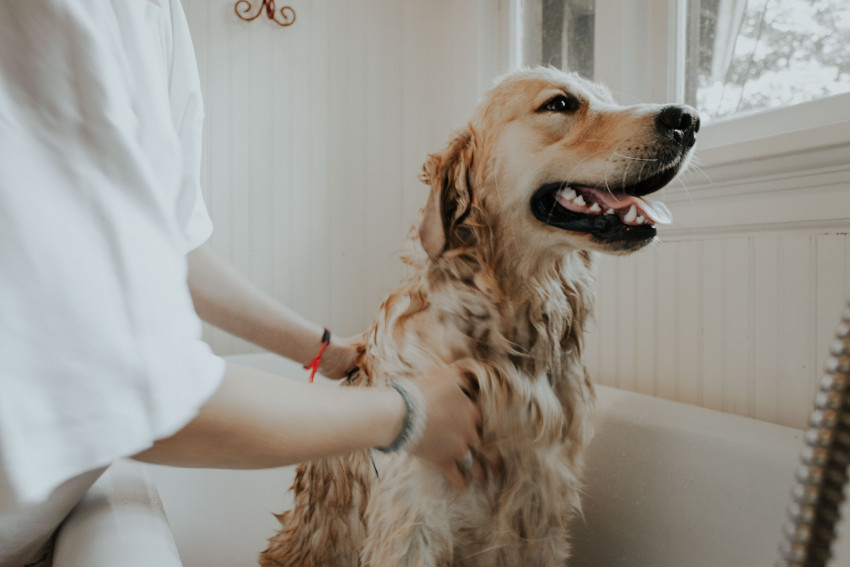This is the year to monetize your love for your furry friends – here’s a comprehensive guide on how to start a doggy day care business.
- Inbox Dollars - Get paid to check your email. $5 bonus just for signing up!
- Survey Junkie - The #1 survey site that doesn't suck. Short surveys, high payouts, simply the best.
- Nielsen - Download their app and get paid $50!
People clearly love their pets and are willing to spend on them. Pet owners spent over $365 billion in 2022, and they are projected to spend an additional $10 billion every year on their beloved pets.
Owning a dog requires unconditional love; however, it also means having added responsibility. F
or starters, what do you do with your pooch when you need to go to work, on vacation, or to an event?
Enter doggy daycare, which promises to look after your furry friend until your inevitable return.
Many dog owners regularly take advantage of doggy daycare services for various reasons. Maybe their dogs make too much noise due to separation anxiety, or they have no backyard, and thus there’s no room for their dogs to run around, or simply because they feel bad for leaving a living being alone for 10+ hours per day with nothing to do and no one to watch them.
The good news for you is that you might be able to easily turn this need into a home-based business, especially if you already own a dog.
Today, we’re going to run down the steps of starting a doggy daycare business from home so you can find out for yourself if you have what it takes to run a profitable business.
How To Start A Doggy Day Care Business From Home
Although the steps you’re going to take are detailed here, I highly recommend reading this blueprint on how to start a dog day care business for a more thorough step-by-step guide.
1. Make sure you have what it takes.
To be able to run a business, it’s certainly a given that you need to have at least a high school degree or a GED, business management skills, communication and customer service skills, and time management skills.
But what specific skills do you need to be able to operate a doggy day care?
What Does It Take To Run A Doggy Day Care?
- Pleasant, friendly demeanor — Both dogs and humans need to be able to connect with you and build trust.
- Physical stamina — Dogs aren’t statues. You’ll be feeding them, running after them, playing with them, cleaning up after them; it can be physically exhausting. Make sure you’re fit to do all of these.
- Medical training — Accidents and emergencies can happen; you’ll need to know how to deal with them. Get training in dog CPR and first aid, and set up contacts with a few local vets in your area for more serious emergencies.
- Basic dog handling skills — Positive reinforcement, basic obedience, voice commands: if you have no idea what they are, I suggest getting familiar with these, as you’ll need to know how to handle different types of dogs through these basic handling techniques.
- Doggy sixth sense — You don’t need to be Cesar Millan, but knowing how to observe and read dog behavior and body language is a definite must.
- Certifications or at least willingness to be certified — In theory, you can start a doggy day care business without certifications, but getting these instills confidence in your clients and gives you an edge over the competition.
If you have a degree in an animal-related course, such as animal science, veterinary technology, and the like, you’re already at an advantage.
If not, then try and find a gig as a pet sitter or dog walker, or volunteer at an animal shelter, animal rescue group, or veterinary clinic.
2. Check your local ordinances.
Before you start your doggy day care, or caring for any dog for that matter, check your city, town, or county ordinances for limitations on home-based businesses.
Due to residential/commercial zoning laws, some residences are restricted from conducting any commercial activity on the premises. Other cities and towns restrict how many pets you can house under your roof.
The best way to know exactly what you can and can’t do is to contact your local government.
Even if your city, town, or county has no specific ordinances pertaining to a dog care business, your homeowners’ association may not allow you to operate such a business due to concerns about noise, smell, pet waste, bites, street traffic, etc.
In short, don’t spend any money or too much time on your dog day care business until you find out if having such a business is even possible.
3. Create a business plan.
Doing your homework and your research before you start will be what makes or breaks your business.
Creating your business plan and determining the scope of your business will inform the rest of your decisions when figuring out how to start a doggy day care.
Here are the important aspects of your business that need to be included in your business plan.
Facilities
- Air conditioning
- Separate areas for small dogs and large dogs
- Feeding area
- Play area
- Rest area
- Outdoor area
- Kennel (for when a dog needs to stay overnight unexpectedly)
- Livestreaming (optional, but a huge advantage over your competition)
Services
- Define your operating hours (most operate 7am to 7pm on weekdays)
- Playtime
- Outdoor time
- Meals
- Naptime
Costs of starting a doggy day care
- Insurance (business, property)
- Facilities
- Supplies
- Licenses and permits
- Advertising and marketing
- Website
Factors to consider when pricing
Generally, doggy day cares charge between $15 and $40 per dog per day. However, you’ll want to do more research before you come up with a figure. Consider the following:
- The competition (what other doggy day care centers charge in your area)
- The demand (how many dog owners are in your area)
- What your local pet owners can afford
- How many dogs you can accommodate
- What services you can offer
- How much you’d need to collect each month to be profitable
Consider offering different rates for half-day, daily, weekly, and monthly membership plans, offering discounts when dogs stay longer.
No joke. Here are the fastest ways to make easy money online. Click here to see how.
You can also consider offering a family rate for those who have more than one dog.
4. Obtain a business license and insurance.
While there is currently no federal licensing requirement to open a doggy day care, states and counties may require that you purchase a dog care license.
The license itself cannot be purchased until your dog care facility (i.e., your house/apartment) passes an on-site health inspection.
Such an inspection determines if your facility is free of physical dangers and toxic chemicals that may harm the dogs in your care.
It also determines if you are able to follow proper sanitation procedures to prevent disease transmission among the dogs in your care.
You should also purchase business liability insurance, which protects you from suffering large monetary losses should a dog be injured or die while in your care.
Finally, to protect your home and personal belongings from dog-induced monetary damage, you should consider getting additional coverage from your homeowner’s insurance.
5. Purchase your supplies.
Now, you’ll need to get everything you need to provide the best care to your dog clients.
Doggy day care supplies you need
- Food and treats
- Bowls for food and water
- Kennels
- Beds
- Leashes
- Toys
- Blankets and mats
- Indoor and outdoor fences
- Cleaning and disinfecting supplies
- First aid kit
Know where you can scrimp and where you need to splurge to get higher quality.
For instance, blankets, mats, and toys that are disinfected, you can get from dollar stores. Area dog shelters and humane societies often have stockpiles of such items, which for whatever reason they cannot use.
However, you’ll want to spend on high-quality food, sturdy fences, effective cleaning and disinfecting supplies, and a complete first-aid kit.
You should also assess and address any potential dangers in your backyard like poisonous plants and jagged fences, as well as the chemicals and tools you store in your garage.
6. Create a Safe Environment
Yes, you’ve bought all the supplies and equipment to serve customers. But is your space safe for dogs to stay in?
Do you have poisonous plants as décor? Examples of plants that are dangerous for dogs include tulips, daffodil, ivy, Pothos, Amaryllis, Chrysanthemum, Yews, Sago palm, Azaleas, Oleanders, Castor Bean Plant, Hydrangeas, and Foxgloves, among others.
Think about separating dogs by size or temperament. Strong fencing or planning designated areas should help with this dilemma.
7. Advertise your dog care business.
The next thing to consider is getting the word out to your potential customers about your business.
Here are some ideas to advertise your doggy day care.
Build a website.
You can make money from home and it doesn't have to be challenging. Click here to see how.
The main thing to do is to create a website that will serve as your business’s home on the internet. It should showcase your doggy day care business, including the services you offer, rates, and special deals and promos.
You can include a page where clients can schedule and book their pets for your day care.
Go on social media.
Advertising on social media is another way to spread the word about your business. You can pay for targeted Facebook ads to local pet parents in your vicinity.
Your social media can then link back to your website, especially the page where they can book your services.
Start a mailing list.
Sending out monthly newsletters can help with sales, engagement, and brand loyalty. Social media is important, but your mailing list is completely yours.
Create offers for first-time clients.
Consider how you might attract hesitant dog owners. Maybe you can offer certain activities like a bonus long walk a day, a visit to the local dog park, or several hours of playtime.
Reward loyal customers.
You don’t want to leave out your existing customers, either. You may want to start a rewards program where they earn points for every booked date, which they can exchange for certain services.
Consider having some merchandise made.
Have t-shirts, mugs, leashes, and dishes made with your doggy day care logo and information, and use them all around your doggy day care and when you’re out.
You can also have pens, keychains, and other small little items to give away to clients.
Host Giveaways and Contests
You won’t run out of contests. From dog Halloween costumes at the end of October, to Christmas costumes in December, and everything else in between, you can encourage your customers to participate and keep your relationship going.
Giveaways and contests work both for existing and would-be clients, which is win-win for any business.
I recommend hosting an event like this once every two months.
8. Vet your customers.
Nothing will shut down your fledgling business faster than dogs coming home from your doggy day care with an infectious disease or injuries from a dog fight.
When accepting a new dog client, have the pet owner fill out a contact information sheet, with the owner’s name, pet name, address, phone number, email address, emergency contact numbers, as well as these same details for their veterinarian.
This information sheet should also include health information for the dog: breed, color, height and weight date of birth, allergies and sensitivities, previous injuries, whether or not they’ve had complete vaccinations for their age, whether or not they’ve been spayed or neutered, and whether or not they’re able to socialize with other dogs.
Aside from these information sheets, it’s advisable to conduct an interview with both the pet owner and the dog present so you can actually assess the dog’s temperament with both humans and other dogs.
You might even consider a trial run wherein the dog receives some extra supervision and one-on-one time with you.
Once you have that dog at your facility, introduce him to a test dog in your care that is known to be non-aggressive.
See how the two dogs interact and if the visiting dog tries to dominate the other dog or even bite it. Doing these tests ahead of time will save you the headache of having an unexpected dog fight break out.
It’s also a good idea to have clear, explicit contracts in place to protect both you, your dog clients, and their pet parents. Outline the exact services you provide, what you don’t provide, what you’re not liable for, and what is expected of pet owners.
Include the terms of payment, cancellation policies, authorization for you to get emergency medical care for the dog if necessary, pet owner’s liability for property damage and/or physical injuries to dogs or humans done by their dog, and authorization for you to provide special requirements, diet, or medication that the dog requires during their stay in your day care.
Having these interviews, trial runs, and contracts in place will help protect your business and ensures that your customers, both humans and dogs, have nothing but positive experiences in your doggy day care.
9. Evaluate Your Progress and Adapt
Any business requires monitoring all aspects, from customer service to products.
After a few months of launch, make sure you’ve been gathering customer feedback, handling your finances (income and expenses) properly, and evaluating your business from top to bottom.
I promise you, the more you listen to your customers and improve your business based on past mistakes, the better business you’ll end up having.
10. (Gradually) expand your services.
If you find that running a doggy day care is both profitable and rewarding, you may want to offer additional services.
Not only does this add value to your business but you can also add to your profits.
For every new service you offer, always draw up a business plan and figure out if the added expense of employees, facilities, supplies, and other costs is worth the income to be earned.
Also, consider the new permits and licenses that you may have to get.
Here are some ideas:
Grooming — Dropping off your dog at day care and getting them back clean, trimmed, and smelling nice is a great experience for owners.
Obedience training — Pet owners that may be having difficulty teaching new skills or address certain behaviors. They’re likely willing to pay extra for this training, so it might be worth hiring certified trainers or getting certified yourself.
Overnight stays — I know you signed up for a doggy day care business, but owners may need to leave their pets with you overnight, for a weekend, or maybe even over multiple days. You can start to offer this on a limited-slot basis and then expand when you can hire enough people to cover overnight shifts.
Walking — You may already be offering outdoor time for your clients’ beloved pets, but having them actually leave your facility and walking them down the street or in a park involves a whole different set of responsibilities (and accordingly, cost).
Pet products — Selling products isn’t technically a service, but if your customer needs them, then you both benefit. Your more regular dog clients may start favoring the food, treats, toys, accessories, and other items that they get from your doggy day care, and their owners may want to get some for them to take home.
Start your doggy day care business today!
A home-based business makes sense in light of the new normal.
Hopefully, this step-by-step guide has been helpful if you’re figuring out how to start your doggy day care business.








Wow!
Very good and insightful article for pet parents and lovers at large. Well done!
I must stress that there aren’t many things better than earning from what you love to do. So if you are a canine lover and can earn financial rewards by doing what you love to do, then that’s a big hit.
On the other hand for prospective clients of such businesses, it reduces the chances of separation anxiety, well as helps your dog develop social skills.
Also, if you happen to be very busy with other commitments and can’t keep an eye on your dog’s health and well being, enrolling for such is nothing short of a good idea.
Once again, great job with this article and site at large. Well done!
There is money to be made if you know what you are doing and can create a loyal client base with relatively well-behaved dogs. I run a dog waste removal company which is also quite lucrative depending on the competition in your area. Give it some thought and best of luck with this venture.
I just became unemployed and am tired off working for peanuts…drive 1 HR and 50 minutes round trip, Monday-Friday, pushed into full time(under protest), and running around like the manager of the place, for $8/hr. My raise after 1 yr was 30¢, and am told I’m lucky I got that. Well, no more!! I’ve been in business before, residential and commercial cleaning. At this time in my life, 63 yo, I cannot retire. My dog has severe separation anxiety. A bred known for that, cockapoo. This would be an ideal business. If there is an ordinance in my village against this, what type of facility should I look for, to possibly rent? If cheap enough. TIA
Marge
Hi, I am in the process of building a 2 run kennel behind my house, I can keep up to 5 dogs without it being a business per the adm & zoning with no HOAs. As a good neighbor, I am installing soundproof & anti-fight panels as well as enclosed fencing. My end goal is to purchase more land and build up to 5 kennels,but for another day. Question,since I am not considered a business how do I go about License and insurance. Thanks, Theresa
I don’t see it mentioned here but the main reason ppl use a day care is they don’t have time in the work day to exercise and stimulate their dogs. As a 4 dog owner I would be noticing- is the caregiver fit enough to exercise my dogs? Is the caregiver knowledgeable enough to circumvent a fight? (Even the BEST dogs will get into a scuffle-can you anticipate it and prevent it or at the very least intercept before any damage is done?) do you know basic CPR? If there is an emergency at your home-in your city-like a flash flood (yes, it happened in hours) do you have a contingency plan?
I’ve been looking into dog waste composting you should check it out, it’s pretty efficient and not very costly
Hi Shannon, Sorry to hear about your job, but kudos to you for taking the initiative and looking into doggie daycare. As for the poop, you’ll have to do what many dog owners (like me) do, and either throw it out into the garbage or find a more creative alternative, like burying or even burning it (in a firepit). I’ve also seen dog poop services that will come over to your house and clean up your yard. Good luck to you.
I’m about to become unemployed. After 5 years at my curent job and repeatedly seeing the corporate greed overtake human life-lines, I’m tired of depending on that monster for my livelihood. I was thinking of starting a small dog, doggie day care from my home. What about the poop?
I have read about the inground septic tanks for a small price at k9 kennel, not sure if it works, but I plan on trying it. Theresa